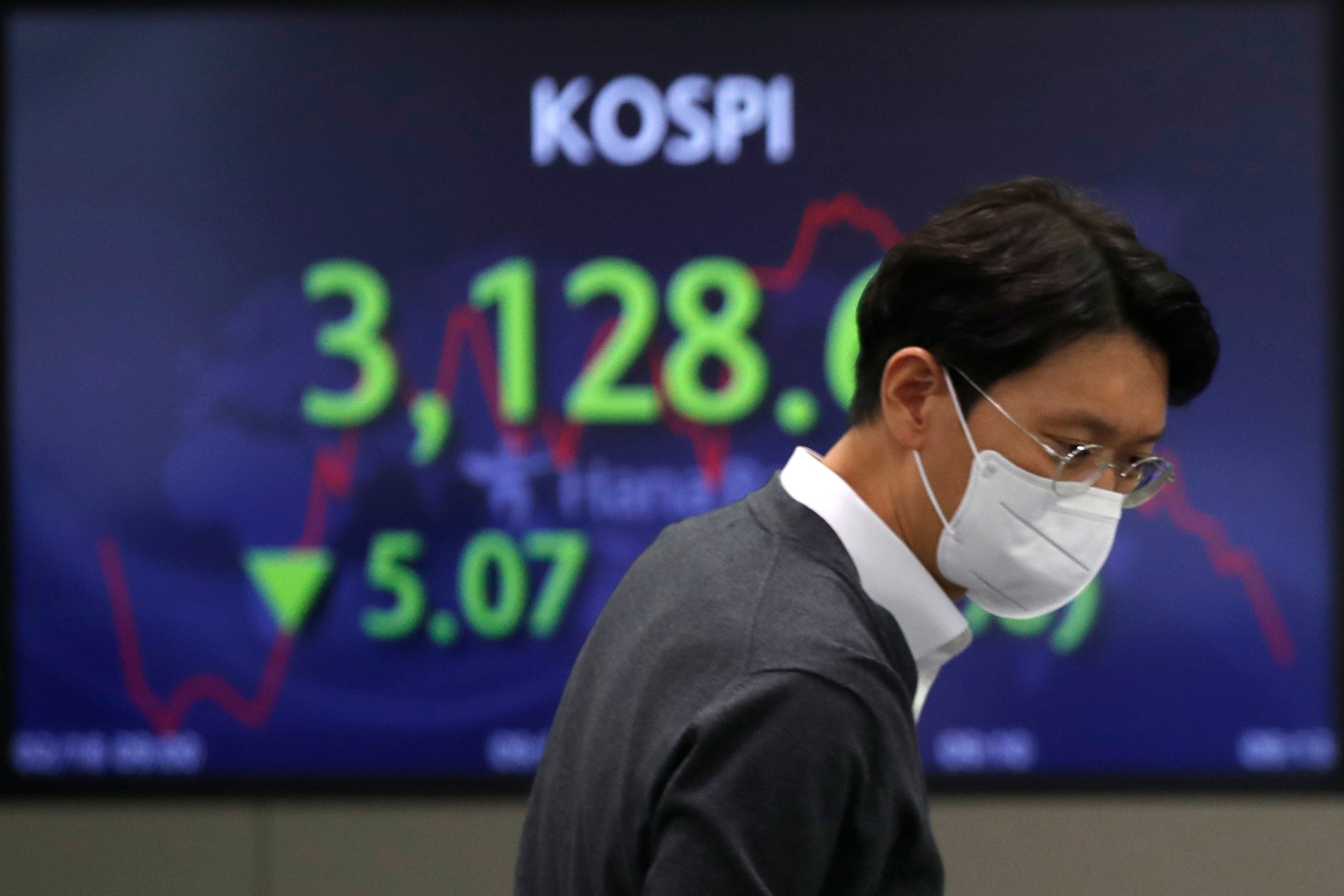Asian shares mostly lower after mixed day on Wall Street
Shares are mostly lower in Asia after a mixed session on Wall Street as losses by technology and industrial companies offset other gains

Your support helps us to tell the story
From reproductive rights to climate change to Big Tech, The Independent is on the ground when the story is developing. Whether it's investigating the financials of Elon Musk's pro-Trump PAC or producing our latest documentary, 'The A Word', which shines a light on the American women fighting for reproductive rights, we know how important it is to parse out the facts from the messaging.
At such a critical moment in US history, we need reporters on the ground. Your donation allows us to keep sending journalists to speak to both sides of the story.
The Independent is trusted by Americans across the entire political spectrum. And unlike many other quality news outlets, we choose not to lock Americans out of our reporting and analysis with paywalls. We believe quality journalism should be available to everyone, paid for by those who can afford it.
Your support makes all the difference.Shares were mostly lower in Asia on Thursday after a mixed session on Wall Street as losses by technology and industrial companies offset other gains.
Shanghai advanced after reopening following the Lunar New Year holiday. Shares fell in Tokyo, Hong Kong and Seoul.
The yield on the 10-year Treasury note held near its highest level in a year, at 1.27%. Bond rates have risen on expectations that pandemic recoveries will push inflation higher, and that has capped buying enthusiasm, as investors have sold to lock in recent gains.
The U.S. Labor Department reported Wednesday that U.S. wholesale prices surged by a record 1.3% in January, led by big gains in health care and energy prices. The bigger-than-expected increase was the largest one-month gain on records that go back to 2009.
Underscoring signs of recovery, the Commerce Department said U.S. retail sales soared a seasonally adjusted 5.3% in January from the month before, the biggest increase since June and much larger than forecast.
Optimism that rollouts of coronavirus vaccines will set the stage for stronger economic growth in the second half of this year have been pushing shares higher.
The Shanghai Composite index gained 0.6% to 3,678.11 and the S&P/ASX 200 was flat, at 6,885.90. Japan's Nikkei 225 lost 0.2% to 30,236.09, while the Hang Seng in Hong Kong shed 1.2% to 30,725.47. In South Korea, the Kospi gave up 1.5% to 3,086.66.
The yield on the 10-year Treasury was steady at 1.28%, near its highest level in a year. The rise in bond yields has raised some concerns about the potential for higher inflation, but has also been a sign that the prospect for economic growth remains good.
On Wednesday, the S&P 500 slipped less than 0.1%, to 3,931.33 after handing back an early gain. The tech-heavy Nasdaq composite dropped 0.6% to 13,965.49.
The Dow Jones Industrial Average rose 0.3% to 31,613.02, a second straight record high. The modest pickup was due in large large part to gains in Verizon Communications and Chevron, which climbed after Warren Buffett’s Berkshire Hathaway said it made major new investments in them in the second half of last year.
Small-company stocks took a bigger hit, with the Russell 2000 index of smaller companies slipping 0.7% to 2,256.11.
Energy prices rose again, adding to a sharp increase the day before due to the frigid weather that’s impacted much of the U.S.
U.S. benchmark crude oil gained 56 cents to $61.70 per barrel in electronic trading on the New York Mercantile Exchange. It surged $1.09 to $61.14 per barrel on Wednesday. Brent crude, the international standard, climbed 74 cents to $65.08 per barrel.
The strong retail sales data appeared to reinforce the perception that inflation is picking up even before the Biden administration has delivered on its proposed $1.9 trillion stimulus package and other spending aimed to get the economy back on solid footing.
That could eventually lead the Federal Reserve to rethink its current policy of keeping interest rates at ultra-low levels.
The minutes from the Fed’s January policy meeting, released Wednesday afternoon, showed the central bank believed the pandemic still poses considerable risks to the economy. The minutes also reflected Fed officials' widespread support for keeping interest rates low in order to boost the economy and help millions of Americans regain lost jobs.
Fed Chairman Jerome Powell has cautioned that inflation could accelerate for a time in coming months as the country opens up. But he and many private economists believe this will be only a temporary rise and not a sign that inflation is getting out of control.
Last month’s jump in retail sales was largely driven by the $600 stimulus checks that went out to most Americans in late December and early January. The data shows that recession-hit Americans are eager to spend cash on necessities, and aren’t saving the funds — which is the goal of stimulus checks.
It potentially means that additional stimulus, likely in the form of $1,400 checks in the $1.9 trillion stimulus plan, will likely provide a necessary boost to the economy.
The U.S. dollar rose to 105.92 Japanese yen from 105.89 yen. The euro strengthened to $1.2047 from $1.2042.